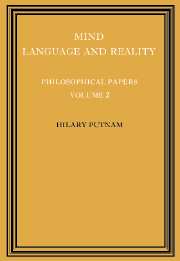Book contents
- Frontmatter
- Contents
- Dedication
- Introduction
- 1 Language and philosophy
- 2 The analytic and the synthetic
- 3 Do true assertions correspond to reality?
- 4 Some issues in the theory of grammar
- 5 The ‘innateness hypothesis’ and explanatory models in linguistics
- 6 How not to talk about meaning
- 7 Review ofThe concept of a person
- 8 Is semantics possible?
- 9 The refutation of conventionalism
- 10 Reply to Gerald Massey
- 11 Explanation and reference
- 12 The meaning of ‘meaning’
- 13 Language and reality
- 14 Philosophy and our mental life
- 15 Dreaming and ‘depth grammar’
- 16 Brains and behavior
- 17 Other minds
- 18 Minds and machines
- 19 Robots: machines or artificially created life?
- 20 The mental life of some machines
- 21 The nature of mental states
- 22 Logical positivism and the philosophy of mind
- Bibliography
- Index
22 - Logical positivism and the philosophy of mind
Published online by Cambridge University Press: 12 January 2010
- Frontmatter
- Contents
- Dedication
- Introduction
- 1 Language and philosophy
- 2 The analytic and the synthetic
- 3 Do true assertions correspond to reality?
- 4 Some issues in the theory of grammar
- 5 The ‘innateness hypothesis’ and explanatory models in linguistics
- 6 How not to talk about meaning
- 7 Review ofThe concept of a person
- 8 Is semantics possible?
- 9 The refutation of conventionalism
- 10 Reply to Gerald Massey
- 11 Explanation and reference
- 12 The meaning of ‘meaning’
- 13 Language and reality
- 14 Philosophy and our mental life
- 15 Dreaming and ‘depth grammar’
- 16 Brains and behavior
- 17 Other minds
- 18 Minds and machines
- 19 Robots: machines or artificially created life?
- 20 The mental life of some machines
- 21 The nature of mental states
- 22 Logical positivism and the philosophy of mind
- Bibliography
- Index
Summary
Any discussion of the influence of logical positivism on the field of philosophy of mind will have to include the application of the so-called verifiability theory of meaning to the problems of this field. Also deserving attention, however, is the way in which Carnap and some of his followers have treated psychological terms – including everyday psychological terms such as ‘pain’ – as what in their own special sense they called theoretical terms; they have suggested that the states referred to by those theoretical terms might, in reality, be neurophysiological states of the brain.
The two lines of thought mentioned roughly correspond to two temporal stages in the development of the movement. During the early years (1928–36) attempts were made to apply verificationist ideas in a wholesale and simplistic manner to all the problems of philosophy, including the philosophy of mind. In recent years (1955 to the present) a much more sophisticated analysis has been offered, but it is one heavily weighted with the observational-theoretical dichotomy and with the idea of a ‘partially interpreted calculus’;. Feigl's identity theory (Feigl, 1958), while very much an individual doctrine and never the view of the whole school, fits chronologically into the transitional years between the two periods.
These two lines of thought also correspond to decidedly different tendencies warring within the divided logical-positivist soul. Verificationism, I think, may fairly be labelled an ‘idealist’ tendency; for, even if it is not identical with the view that the ‘hard facts’ are just actual and potential experiences, it makes little sense to anyone who does not have some such metaphysical conviction lurking in his heart.
- Type
- Chapter
- Information
- Philosophical Papers , pp. 441 - 451Publisher: Cambridge University PressPrint publication year: 1975
- 2
- Cited by



